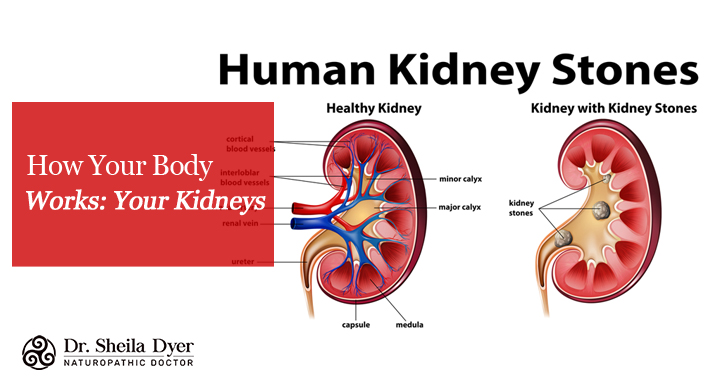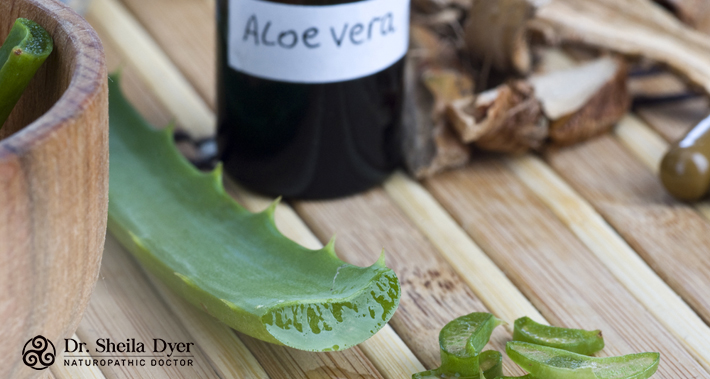You know you have kidneys.
You probably have an idea of what they look like, and maybe even where they are in your body.
But how much do you know about what your kidneys do and how to keep them healthy?
Kidney health is serious business, as anybody who’s pursued kidney stone naturopathic treatment can tell you.
But while kidney stones might be immediately attention grabbing, it’s not the only issue that can come up.
Let’s take a closer look at your kidneys, from a Toronto naturopathic doctor’s perspective.
What Are Your Kidneys?
Your kidneys help regulate several aspects of your health.
Their main job, though, is to remove waste, excess nutrients, and extra fluid out of your blood.
Made up of tiny blood vessels that connect to a system of tubes, your kidneys are sort of like a sophisticated filtration system.
Each kidney is about the size of your fist, and most people have two.
Your kidneys are located on either side of your spine, right around the bottom of your rib cage.
What Do Your Kidneys Do?
Your kidneys are hard working little organs, which is perhaps why we each get two of them.
They help regulate your blood pressure, your hormones, and your internal pH levels.
RELATED: Hormonal Issues Naturopath
They also help your body absorb and regulate essential nutrients like calcium, sodium, and potassium.
But your kidneys are best known for filtering your blood to eliminate excess waste, acidity, fluids, and toxins.
Common Kidney Conditions
Kidney disease is an umbrella term for a variety of ailments.
Kidney disease occurs when your kidneys have become damaged in a way that prevents them from functioning properly.
This kind of damage is usually brought on by health conditions like diabetes, heart disease, high blood pressure, or other chronic health concerns.
1. Kidney Stones
Kidney stones are small mineral crystals that can form in your kidneys.
When you have too much of certain minerals in your body, your kidneys and digestive system may not have enough fluids and other nutrients to filter them out.
This can lead to minerals clumping together and forming small crystals, or stones.
Some kidney stones are as small as a grain of sand and pass unnoticed when you urinate.
Larger kidney stones, however, can block the flow of urine and become quite painful.
RELATED: Naturopathic Doctor For Digestive Health
2. Chronic Kidney Disease
Chronic kidney disease is a long term condition and the most common form of kidney disease.
Your kidneys contain nearly a million filters called nephrons.
Each nephron contains tiny blood vessels called glomeruli, which clean your blood as it filters through them.
Chronic health conditions like high blood pressure and diabetes can put a lot of pressure on these blood vessels, causing their walls to break down over time.
Chronic kidney disease occurs when the glomeruli are so damaged that they can no longer filter your blood effectively.
If you have chronic kidney disease, you may need dialysis or a kidney transplant so your body can continue to filter out waste and toxins.
3. Urinary Tract Infections
A urinary traction (UTI) is a bacterial infection anywhere in your urinary system – most commonly in your bladder or urethra.
UTIs can be treated easily and quickly in most cases.
If left untreated, however, bacteria can spread to your kidney, potentially causing damage or even kidney failure.
4. Polycystic Kidney Disease
Polycystic kidney disease is a condition in which multiple small fluid filled sacs, or cysts, form in the kidney.
Over time, these cysts can overwhelm your kidney, interfering with its function and possibly causing kidney failure.
It’s worth noting that having a single cyst in one of your kidneys does not mean you have polycystic kidney disease.
Polycystic kidney disease is a serious genetic condition, while kidney cysts are common and rarely cause much issues.
5. Kidney Failure
Kidney failure is an acute form of kidney disease that can be life threatening.
Kidney failure occurs when your kidneys suddenly stop working altogether.
Symptoms of kidney failure include:
- Throbbing or tenderness in your back, below your ribs
- Not being able to urinate, or producing very little urine
- Fluid retention
- Swelling in your legs, ankles, and feet
- Puffiness or swelling in your face or around your eyes
- Indigestion, nausea, vomiting, or loss of appetite
- Anemia
- Sudden increase in potassium levels
- High blood pressure
- Confusion
- Insomnia
- Anxiety
- Chronic fatigue
- Difficulty concentrating (brain fog)
- Loss of sex drive
- Inflammation of the pericardium (the fluid filled sac around your heart)
If you are experiencing these symptoms, go to an emergency room right away, since this disease is life threatening.
How To Tell If You Have A Kidney Issue?
In its early stages, kidney disease can be easy to miss.
Some early signs of kidney disease include:
- Loss of appetite
- Chronic fatigue
- Inability to focus on a task
- Sleep disruptions
- Muscle cramps
- Swollen feet and ankles
- Puffy eyes in the morning
- Dry, scaly skin
- Getting up frequently to urinate, especially during sleep
Can You Survive Without Your Kidneys?
Surviving without your kidneys is possible, but it requires a lot of medical care.
Because your kidneys are responsible for producing urine, if your kidneys fail or have to be removed, you will need kidney dialysis.
Hemodialysis and peritoneal dialysis are two medically assisted methods of filtering your blood when your kidneys can’t.
Hemodialysis involves pumping your blood through a machine and back into your body.
The machine removes waste and excess minerals from your blood just as healthy kidneys would.
This is typically done 3 to 5 times a week, either at home or in a clinic setting.
Peritoneal dialysis uses your peritoneum, the inner lining of your abdominal wall, as a stand in for your kidneys.
A tube is inserted into your abdomen to deliver a special fluid called dialysate.
As blood flows through the peritoneum, waste is drawn into the dialysate and is pumped out of the abdomen.
Peritoneal dialysis can be done either using a small machine that cleans your blood a few times a day, or overnight.
Natural Solutions For Healthy Kidneys
The best way to avoid undergoing treatment for kidney disease is to adopt healthy habits before kidney disease begins.
There are several natural solutions that can help protect your kidneys as well.
A diet rich in nutrient dense, unprocessed foods is a good overall strategy.
RELATED: Nutritional Counselling Naturopath
If you have already been diagnosed with kidney disease, I can help you to identify which foods will work for your specific needs.
For example, while dark, richly coloured fruits and vegetables might be great for preventing kidney disease, the oxalates they contain may put added stress on diseased kidneys.
Some general dietary tips for kidney health:
- Avoid alcohol and caffeine
- Avoid high sodium foods
- Avoid foods high in added sugar
- Limit your phosphorus intake
- Opt for fresh, whole foods over processed ones
If you have some stage of kidney disease, but not kidney failure, there are also herbal remedies and supplements that can help prevent further damage.
These include:
- Aloe vera, which can prevent and reduce crystals in your urine
- Vitamin B6, which may help reduce the amount of calcium oxalate in your blood
- Vitamin E, which does the same as vitamin B6
- Cranberry extract, which may help prevent crystals in the urine
- Helichrysum essential oil, which can support detoxification
- Lemon essential oil, which can support defoxification
- Magnesium, which helps prevent kidney stone formation
These natural solutions may interact with other medication you’re taking though.
So before you take them, it’s important to…
Book Your Appointment With Dr. Sheila Dyer, ND, Today
Kidney health is an important part of your overall well being.
If you are at risk due to conditions like chronic high blood pressure or diabetes, natural solutions can help protect your kidney health.
If you have kidney disease or kidney failure, natural solutions can be an important part of preventing further damage and improving your symptoms.
I’m Dr. Sheila Dyer, a naturopathic doctor in Toronto, and I can help.
To start getting your internal systems in balance book your appointment with Dr. Sheila Dyer, ND, today.
If you have questions about naturopathic medicine, or would like to start with your first consultation, contact me, and let’s book an appointment.
Dr. Sheila Dyer, ND1080 Dovercourt Rd,
Toronto, ON M6H 2X8
(416) 554-5135
► https://g.page/DrSheilaDyerNd
Dr. Sheila Dyer is a Naturopathic Doctor and a practicing registered nurse offering holistic healthcare with a scientific focus

